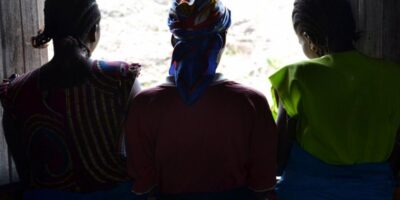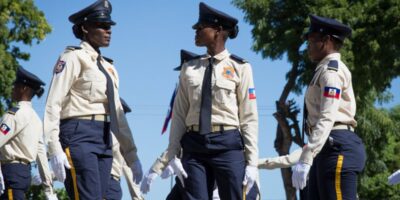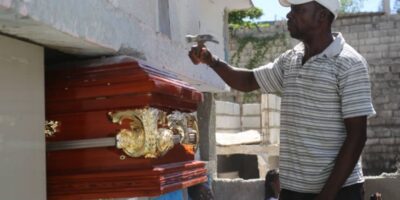Although many women graduate with degrees in journalism every year in Haiti, few of them remain in the profession
A former intern in the Culture division of the National Radio and Television of Haiti (RTNH) in April 2014, I only stayed briefly. The challenges were considerable. For instance, I received thinly veiled threats from a cameraman, implying that I should be nicer if I didn’t want to end up with unfavorable footage for my reports.
At this public broadcasting station, finding a driver and a cameraman to accompany you to cover a topic was a challenge. Vehicles were constantly breaking down, and it was common for just one camera to be shared among two or three journalists.
As a result, journalists form friendships here and there to ensure that there is always a team available to accompany them in the field. This situation grants a lot of power to the drivers, cameramen, and technicians, who don’t hesitate to abuse it.
For instance, I received thinly veiled threats from a cameraman, implying that I should be nicer if I didn’t want to end up with unfavorable footage for my reports.
The RTNH has repeatedly found itself embroiled in public scandals involving sexual harassment by its officials.
During my internship, rumors were circulating that positions and appointments for female employees were often awarded on the basis of the connections and insistence of a reputedly « zealous » member of the administration. This executive promptly invited me to « have a drink » during the first week of my internship.
The « national » channel was contacted through its Facebook page for comments before publication. This article will be updated if the institution responds.
In reality, women — who are already underrepresented in the field — also face police brutality and discrimination, often going unnoticed.
In the context of the passing of the exceptional Liliane Pierre Paul, it’s important to discuss the challenges that women face in practicing journalism in Haiti.
You can also watch : Videyo | Avan Liliane Pierre-Paul te kite n, men sa l te di n sou avni Ayiti
Pernicious acts of violence within the media are commonplace, according to the statements of several colleagues.
Although many women graduate with degrees in journalism every year, few of them persist in the profession.
My experience at RTNH is not unique.
Journalists form friendships here and there to ensure that there’s always a team available to accompany them in the field.
Vanessa Étienne, an independent journalist, explains that she has previously encountered colleagues whose attitude towards her was « clearly paternalistic. » These colleagues, she says, tried to teach her about her profession despite her extensive experience.
« When you come from a provincial town, it’s already very complicated to establish yourself as a professional in Port-au-Prince, » Étienne testifies. « If you’re a woman, » the professional continues, « there will always be someone less competent than you trying to lecture you. »
Also read : «En Haïti, les photographes sont considérés comme des fouineurs»
When it’s not about ordinary sexism, such as inappropriate comments about her attire, Étienne explains that she has to fight tooth and nail to be entrusted with frontline issues to work on.
« Before going freelance, I worked in a newsroom where I almost exclusively covered press conferences or festive events, » Étienne says. « It’s a part of the job, and that’s perfectly fine, » she says. « But it leaves me no room to grow as a journalist. »
« If you’re a woman, » the professional continues, « there will always be someone less competent than you trying to lecture you. »
Other colleagues report facing a lack of respect on a daily basis. Professional Thara Lajoie illustrates this issue.
« I studied journalism [at the Center for Communication and Administration Training – ISNAC], and despite that, I’m not taken seriously in my work, » Lajoie asserts.
Furthermore, the lady continues, « It’s sometimes difficult to find sources when I have a report to complete. I have the impression that this is partly because I’m a woman. »
Also read : Chery Dieu-Nalio : « La caméra est ma première femme »
An investigation published on AyiboPost on October 7, 2020, already drew attention to the lack of visibility of women in political shows, which are much listened to and appreciated in the country.
Women’s short longevity in the profession is also due to a variety of other reasons, including the harassment and threats they face.
Dieuline Gédéus, a journalist since 2018, works in the broadcasting field at Canal 11, an almost exclusively male sector. She faces the same issues and comments that put her skills into question.
« I am often a victim of sexism [outside of the institution], » says Gédéus. « Sometimes, I am seen as a woman who doesn’t belong in the field, » she says. The comments usually come from men who suggest that there are « many other choices in life, like starting a family or pursuing a different profession. »
Women’s short longevity in the profession is also due to a variety of other reasons, including the harassment and threats they face.
Danise Davide Lejustal is from Jacmel. She points to « family pressure and the security situation » as the challenges she faces in her profession, having gone through journalism school.
« It’s a delicate profession, » attests Lejustal. « When I handle topics related to politics or when covering protests, my family often worries about me. »
The young woman, who has been working in radio for many years, shares additional precautions she has to take as a female journalist.
« In Jacmel, » Lejustal says, « there aren’t many women in this field. It often happens that men think they are more capable, even if you do your job better than they do. Reporting in remote areas outside the city is not easy, » adds the professional, who says she always has to be accompanied by a man: « Access to these areas is not easy, » explains Lejustal.
Also read : La précarité des journalistes fragilise la démocratie en Haïti
Another problem facing journalists is the challenge of finding female sources for their work.
In an online article published on August 29, 2009, on Relief Web, Danielle Magloire, a sociologist and feminist activist, highlighted the sexual and sexist violence that women holding public positions, particularly in political matters, are subject to.
In the article, the specialist had this to say: « When it’s a woman, they attack her integrity as a person, often on issues related to sexuality. »
Another problem facing journalists is the challenge of finding female sources for their work.
Since the Me Too movement in 2018 up until today, three feminist media outlets have emerged, bringing together journalists in women-only spaces. These platforms provide women with the opportunity to work without enduring the burden of sexism. However, financial challenges and criticisms regarding women-only spaces present obstacles for these teams as they strive to overcome them. Exclusive women-focused media outlets still remain rare in the country.
The late Liliane Pierre Paul and Marie Lucie Bonhomme are the first to come to mind when discussing women journalists in Haiti. There is therefore a clear lack of role models in the profession to inspire more women to pursue long-term careers in this field.
Also read : Lyonel Trouillot | Adieu Liliane ! L’infatigable veilleuse, l’Oracle !
Myriam Délices, twenty years old, is currently studying to become a journalist at the Polytechnic Training Center in Tabarre. She reveals that she doesn’t know any other women in the field except for the two personalities mentioned above. She adds that before Liliane Pierre Paul’s passing, she wouldn’t have been able to recognize her in a photo.
Advancement in journalism appears to be challenging for women as well.
As part of a program to support women journalists, the Pen Haiti Center collaborated with several media outlets in the capital. The institution, where I worked, found that almost all of these outlets had men at the head of their editorial teams.
So, there is a clear lack of role models in the profession to inspire more women to pursue long-term careers in it.
Despite the long list of members of the Solidarity of Haitian Women Journalists (SOFEHJ), which has recently celebrated its fifteenth anniversary, opportunities for women in the profession remain limited.
In 2016, a review by the research institution Panos Caribbean, points out that the leading figures in the Haitian media are women, while men tend to be found at the highest level, in decision-making positions.
Despite the challenges described above, several women journalists from diverse backgrounds have stood out in recent years. I can point to Shelove Perrin in sports or Lunie Joseph in politics.
These exceptions should not obscure the scale of the problem of female representation in various professions. Is the limited inclusion of women in journalism not an illustration of their exclusion in all sectors of the country?
SOFEHJ has recently celebrated its fifteen years and not thirteen, as stated in an earlier version of this article. 16:31, August 29, 2023.
Dieuline Gédéus works at Canal 11 and not at Radio Télé Kiskeya, as mentioned in an earlier version of this article. 11.27 4.9.2023
© Cover image : freepik
English translation by Sarah Jean.
Watch our special interview conducted with journalist Liliane Pierre-Paul in 2015, where she was responding to a simple question from AyiboPost: « Kòman w wè Ayiti nan 50 lane ? » :
Stay in touch with AyiboPost through :
▶ Our Telegram canal : click here
▶ Our WhatsApp Community : click here







Comments